Comparative Economic Systems: Culture, Wealth and Power in the 21st Century
Comparative Economic Systems: Culture, Wealth and Power in the 21st Century is backordered and will ship as soon as it is back in stock.
Couldn't load pickup availability
Genuine Products Guarantee
Genuine Products Guarantee
We guarantee 100% genuine products, and if proven otherwise, we will compensate you with 10 times the product's cost.
Delivery and Shipping
Delivery and Shipping
Products are generally ready for dispatch within 1 day and typically reach you in 3 to 5 days.
Book Details
-
Author: Steven Rosefielde
-
Publisher: Rawat Publications
-
Binding: Paperback
-
Release Date: 01-01-2004
-
ISBN: 140512492X
-
Pages: 304
-
Cover: Paperback
-
Language: English
-
Sale Territory: India
About the Book
Comparative Economic Systems: Culture, Wealth and Power in the 21st Century explains how culture, in various forms, alters the standard rules of economic engagement, creating systems that diverge significantly from those predicted by the theory of general market competition. This insightful analysis is based on established economic principles but integrates a broader view, recognizing that individual utility-seeking behavior may be influenced by cultural factors, political goals may take precedence over public well-being, and business misconduct may have socially detrimental consequences.
The book challenges traditional conceptual misunderstandings about the comparative merits of free competition and perfect governance. It explores how, in many instances, the same results can be achieved using either of these mechanisms or by combining them effectively. Additionally, the book delves into the reasons why traditional economic variables such as fixed and variable inputs, management practices, entrepreneurship, technological progress, and economic governance fail to adequately explain issues like the increasing poverty seen in the world’s poorest nations.
Through clear explanations, end-of-chapter questions, and an extensive glossary, the book offers readers a deep understanding of the key concepts and frameworks that shape the economic systems of today’s world.
About the Author / Editor
Steven Rosefielde is a Professor of Economics at the University of North Carolina and a member of the Russian Academy of Natural Sciences. His extensive academic work has focused on comparative economic systems, making him a key voice in the field.





